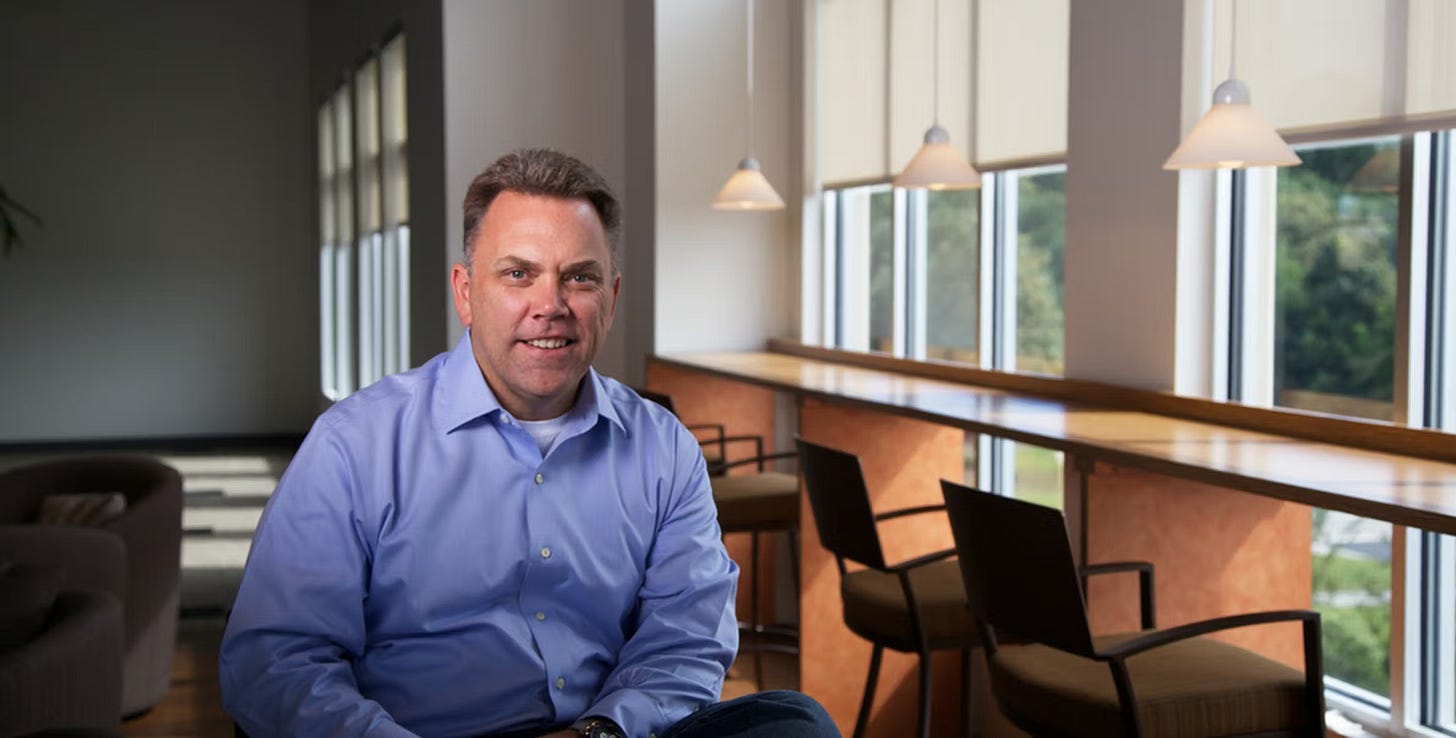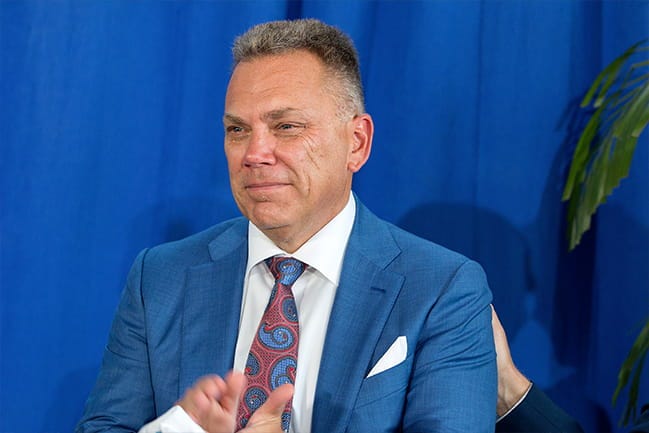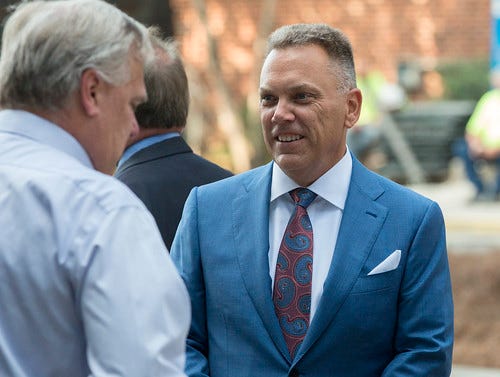Great ideas are unpredictable
In 1995, Shawn Jenkins sat on his bed and composed an eight-page business manifesto in his journal. Five years later the idea came to life in the form of Benefitfocus.
Great ideas are unpredictable. They show up at the most peculiar times and places. Apple was born in a garage. Facebook hatched in a Harvard college dormitory. In 1995, Shawn Jenkins sat on his bed and composed an eight-page business manifesto in his journal. Five years later the idea came to life in the form of Benefitfocus.
“In my MBA Capstone course, I wrote a strategic plan on this idea,” said Jenkins. “A lot of people made up a business. For me, this idea was alive. How could we take technology and use it to make benefits better? The original business plan was written in my Capstone course.”
Jenkins earned a master of business administration degree from Charleston Southern University in May 1995. He was living in Summerville and working for a nonprofit organization when he began to consider pursuing an advanced degree.
“I had a lot of business ideas, a lot of aspirations, but I never tested them. Going into the MBA program, meeting the professors and being around other people who were self-motivated and pushing themselves to do better, gave me an incredible sense of confidence, and the ideas I was developing and the way I saw business really validated a lot of things.”
In June 2000, three months after the NASDAQ crashed, Jenkins, now president and chief executive officer, and Mason Holland, now chairman of the board, founded Benefitfocus.com, Inc.
“He and I set out to create this vision of a better way to manage benefits,” said Jenkins. “There weren’t a lot of people that came out of the woodwork to encourage us. We were met with mostly resistance by the investment community.”
The business community considered the idea radical; the decision to launch a new software company – in light of the dot-com bust and the NASDAQ crash – was doomed to fail. During the early stages of the company, Jenkins and his team presented the concept to a group of potential investors, hoping to rally community support and funding.
“We were asked to stand outside while they discussed our presentation. They brought us back in, and in front of all these people, told us all the reasons why we were going to fail. No one is ever going to pay you to do this in Charleston.”
Jenkins called the experience “humiliating,” – and motivational. “I’ve always used that as fuel to be successful,” he said. “I don’t ever allow those meetings to fuel self-doubt.”
He took mental snapshots of all the faces he saw that day. Fifteen years, 1,500 associates and 25 million consumers served later, Jenkins said he thought about those investors the day he stood on the platform and rang the opening bell at the NASDAQ. On that day, Benefitfocus released more than three million shares of stock to the public.
“I had a quiet moment for those people,” he said. “Every entrepreneur has stories like that, where someone comes along and says not only do I not believe you – but piles on and tells you why you are not going to make it.”
Not everyone ignored Benefitfocus though. In 2001, Piggly Wiggly Carolinas was the first client. Soon after, Blue Cross Blue Shield of South Carolina came onboard. “They were very encouraging, and they saw the vision of what we could do,” said Jenkins.
Those baby steps led to giant leaps. They are the moments that Jenkins remembers clearly today: The first employee; the first customer; the first profit (2003); the first stock sold (2013).
“Developing a product that someone will pay you for takes a lot of work,” said Jenkins. “You have to have the talent and recruit a team that believes in you. Getting that first customer, getting someone to step out in faith and buy a product from a new company was a challenge.
“Every time you clear a hurdle, you immediately create the next set of hurdles. We had no customers, so we needed a customer. When we got a customer, we needed another customer – but we had to satisfy the first one. When we had five customers we had to learn how to keep five customers happy, which is much different from serving 100 customers. As you develop solutions to challenges, you are creating the next challenge, which is the beauty of it – and a great mystery. You don’t know exactly what’s coming.”
By 2004, Benefitfocus had established itself, turning a profit for the first time and expanding the company by opening a second location in Greenville, South Carolina. The Charleston Digital Corridor andCharleston Regional Business Journal named Benefitfocus “Innovator of the Year,” and The South Carolina Technology Alliance tabbed the company the “Fastest Growing Tech Company in South Carolina.”
In 2006, Benefitfocus moved into its new 65,000-square-foot, state-of-the-art headquarters on Daniel Island in Charleston. Just three years later, in 2009, the company celebrated the opening of a second building – Design +Engineering – on its main campus.
The facility is not your typical large corporate environment. For proof, look no further than the main floor where a classic 1959 red-and-white Corvette sits on display. When a guest steps off the elevator to the third floor, they are greeted by a Ducati motorcycle. They are eye-catching, even breathtaking. Both make a nice conversation piece. They are also expensive. And, more importantly, priceless.
The purpose is to serve and inspire the associates with their design and precision. Jenkins said people – human capital as economist Adam Smith defined it – are Benefitfocus’ greatest asset. In the second edition of the company’s book, Winning with Culture, Jenkins emphasizes “… each new associate adds something special to the overall culture and enhances it.” Jenkins said company culture is part of the framework for decision-making.
“The passion that our people, our engineers and designers, bring to our products, combined with what you can do with the technology gets me excited,” said Jenkins. “The social mission, to help people provide for their families, and the original values – Provide Anticipatory Service. Respect The Individual. Celebrate. Together. – are fundamentally still intact and actually stronger.”
Two decades have passed since Shawn Jenkins was in a Charleston Southern University classroom, but he is still a student. The stack of books on leadership and culture on the conference table suggests he’s back in the MBA program. He loves to learn and reads voraciously. Jenkins said his experience at CSU is part of the foundation for his success.
“In my experience, what the degree did for me is build confidence in myself,” he said. “It enabled me to think bolder and take bigger action as a result of having gone through the formal education process.”
Jenkins also noted, in his experience as a CEO for a large technology firm, higher education is a valuable asset.
“We hire creative people,” said Jenkins. “Benefitfocus is looking for people that are extremely bright, creative, energetic, passionate and positive. Those things don’t always come across on the resume, so we do a lot in our interview process. For some of our product development and software engineering roles, we’re looking for folks that have graduate level degrees, PhDs in some cases. So if your career lines up that way, degrees are supremely important.”
Benefitfocus’ internship program has opened its doors to college students. Jenkins said the company wants to help students (and prospective future associates) begin to understand technology.
“Software is such an experiential thing. The user experience, the interaction; technology is innovative, disruptive. You really have to immerse yourself in it. What we love about our internship is it allows you to dive deep into an area, something you have an interest in, and very quickly get a lot of experience. You can be around the people, the environment and culture of a software company, which is different than most traditional companies.”
Since 2012, Benefitfocus has continued to grow, opening a new office in San Francisco (2012), becoming a publicly traded company, trading on the NASDAQ Stock Market (2013) and adding a new Customer Success Center on its Charleston campus (2015).
“What we can do with technology has flourished,” he said. “The idea that you can put all your benefits in your pocket on a mobile device, that you can deliver data instantaneously to someone as they’re making decisions … that kind of stuff is radically different than in 2000, but it only serves to fan the flame of our passion for doing the work that we’re doing.”
“Our footprint in the market and financial resources are a lot bigger,” said Jenkins. “The impact you can have for good is significant. We’ve been at this idea for 15 years, and we’re just getting started. I mean, we’re a large company now; we’ve gone public, but the amount of runway ahead of us is much longer than the runway behind us.”
Today, Benefitfocus has locations in Charleston and Greenville, South Carolina; Tulsa, Oklahoma, and San Francisco, California, and is a leading provider of cloud-based healthcare benefits software. Jenkins said the company is experiencing “hypergrowth,” expanding to 1,500 associates and increasing its year over year revenue growth to 31 percent in 2014. Benefitfocus is bigger, both physically and financially.
“We are 15 years into growing a big company,” said Jenkins. “The ideas are still coming, but they are attached to the original vision.”
The original vision is never far from Jenkins’ hands – or eyes. He has been carrying his eight-page manifesto around with him for two decades, a constant reminder of where he came from, what he believes and why he’s so successful.






